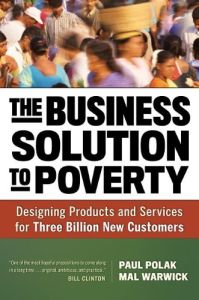Join getAbstract to access the summary!

Join getAbstract to access the summary!
Paul Polak and Mal Warwick
The Business Solution to Poverty
Designing Products and Services for Three Billion New Customers
Berrett-Koehler, 2013
What's inside?
How can the business world employ and sell to the almost three billion people now living on $2 a day?
Recommendation
Paul Polak and Mal Warwick, two credentialed veterans in the war against poverty in the “Global South,” make a case that the decades-long efforts of public and private forces to better the lot of the world’s desperately poor have largely failed. They offer an alternative – a proven “business method that transforms the poor into employees of profitable local enterprises and improves improve their quality of life. The authors outline workable strategies and offer examples of successes and failures. They stress product affordability, simplicity, “aspirational branding” and the potential to scale up. The issue of scale – expanding from hundreds of thousands of customers to billions across the globe – remains a significant obstacle. Polak and Warwick hold that multinational corporations must recognize that their continued growth depends on creating markets and products for these populations. getAbstract recommends the authors’ illuminating work to transnational executives, entrepreneurs, inventors, investors, international development officers, NGOs and anyone who seeks viable answers to the problem of world poverty.
Summary
About the Authors
Paul Polak founded IDE and Windhorse International, and cofounded SpringHealth India. Social responsibility advocate Mal Warwick is board chairman of Mal Warwick-Donordigital.





















Comment on this summary